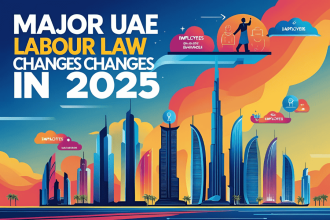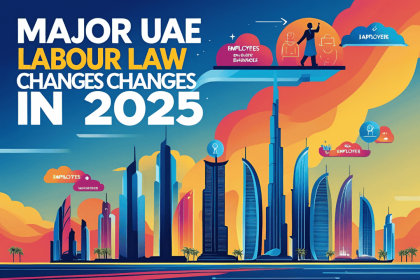As the UAE continues to surge forward in its ambitious national development agenda, the Ministry of Human Resources and Emiratisation (MoHRE) has issued a crucial reminder to private sector companies across the country: the clock is ticking to meet their Emiratisation targets for the first half of 2025.
Private establishments with 50 or more employees are now in the spotlight, with a clear directive from MoHRE to achieve at least a 1% increase in the number of UAE nationals employed in skilled roles by June 30, 2025. This mandate is not just a policy requirement—it is a cornerstone of the UAE’s broader vision to build a sustainable, inclusive economy where Emirati talent is an integral part of the private sector’s success.
Understanding Emiratisation and Its Role in the UAE’s Future
Emiratisation is a national policy initiative that aims to increase the representation of UAE nationals in the country’s workforce, particularly within the private sector. Historically, the public sector has been the primary employer of Emiratis, but as the UAE diversifies its economy and reduces dependence on oil, integrating local talent into private businesses has become more critical than ever.
Launched under the Nafis programme, Emiratisation focuses on ensuring that qualified UAE citizens are not only employed but empowered in meaningful, skilled roles. This initiative aligns with the UAE’s Centennial 2071 vision and its ongoing transformation into a knowledge-based economy.
A Mid-Year Deadline: What Private Sector Employers Need to Know
With the mid-year deadline fast approaching, MoHRE has underscored the importance of compliance. Private companies employing 50 or more individuals must demonstrate a minimum 1% increase in Emirati hires in skilled job categories. These hires must also be officially registered with an approved social security fund, and companies are required to consistently fulfill their financial contribution obligations.
From July 1, 2025, the Ministry will commence a nationwide verification campaign to assess which establishments have met the targets and which have fallen short. Companies that fail to comply will be subject to financial penalties, adding an extra layer of urgency for those yet to fulfill the requirements.
MoHRE’s Statement: A Call to Action and Recognition of Progress
Her Excellency Farida Al Ali, Assistant Undersecretary of National Talents at MoHRE, emphasized the positive developments in the UAE labor market, pointing out how robust economic growth has paved the way for private companies to meet their Emiratisation goals more easily.
“The impressive performance we have seen in the labour market, coupled with the UAE’s rapid economic growth, serve to enhance private sector companies’ ability to meet their Emiratisation targets,” Al Ali said. “This progress goes hand in hand with a well-established partnership approach between the Ministry and the Nafis programme.”
She added that the engagement of private companies in this initiative is not only commendable but essential for long-term national success. By the end of April 2025, over 136,000 Emiratis had secured employment in the private sector across 28,000 companies—an unprecedented achievement that underscores the momentum behind this policy.
Incentives for Compliance: The Emiratisation Partners Club
To further encourage participation and reward excellence, MoHRE offers a range of incentives to establishments that exceed expectations in their Emiratisation efforts. Chief among these is the prestigious Emiratisation Partners Club, a membership-based program for companies that demonstrate exceptional compliance and innovation in hiring UAE nationals.
Members of the Club are entitled to a host of benefits, including:
- Up to 80% discounts on MoHRE service fees.
- Priority access to government procurement opportunities.
- Enhanced brand reputation and visibility as a national employer of choice.
- Networking opportunities with like-minded companies leading in Emiratisation efforts.
This initiative is not just about ticking regulatory boxes—it’s about forging a long-term, mutually beneficial relationship between the government and private sector employers who share a commitment to developing Emirati talent.
Combatting Fraud: MoHRE’s Inspection System and Legal Enforcement
Despite the success and widespread support for Emiratisation, MoHRE has been vigilant in addressing potential abuses of the system. A sophisticated digital inspection mechanism has been deployed to detect and penalize violations such as “fake Emiratisation”—a fraudulent practice in which companies may hire Emiratis on paper without assigning them real roles or responsibilities.
Between mid-2022 and April 2025, this system identified approximately 2,200 establishments involved in such violations. Legal measures, including fines and other punitive actions, were taken against those found guilty. This strong stance reinforces the Ministry’s commitment to genuine, meaningful employment opportunities for UAE citizens—not tokenism or compliance theater.
Reporting Non-Compliance: Empowering the Public and Employees
Transparency and accountability are key pillars of the Emiratisation framework. The Ministry has made it easier than ever for individuals to report violations through multiple accessible channels:
- Call Centre: 600590000
- MoHRE’s Smart App: Available on iOS and Android
- Official Website: https://www.mohre.gov.ae
These platforms ensure that Emiratis, expats, and corporate stakeholders can play an active role in upholding the integrity of the Emiratisation initiative.
Nafis Platform: A Hub of Qualified Emirati Talent
One of the standout features enabling the success of this programme is the Nafis platform. Designed to streamline and simplify the hiring of Emirati talent, Nafis provides access to a robust pool of qualified candidates across various skill levels and industries.
Companies are encouraged to use the platform to not only fill their quotas but also to identify long-term talent that can contribute meaningfully to their operations. From finance and healthcare to IT and engineering, the diversity of skills available on Nafis ensures that every company can find candidates suited to their unique business needs.
Strategic Implications for Businesses: Why Emiratisation Matters
For business leaders and HR departments, complying with Emiratisation requirements isn’t just about avoiding penalties. It’s about future-proofing their organizations.
Here’s why companies should view this as an opportunity rather than an obligation:
- Access to Government Support: Compliant businesses receive preferential treatment in public sector contracts and procurement.
- Workforce Stability: Emirati employees offer long-term employment potential, reducing turnover rates and training costs.
- Cultural Alignment: Emirati hires help companies align better with local customs, languages, and customer expectations.
- Corporate Citizenship: Businesses that support national goals bolster their reputation and appeal to stakeholders.
Challenges and Opportunities Ahead
While progress has been made, there are still challenges in matching job roles to candidate expectations, enhancing private sector attractiveness, and ensuring long-term retention of Emirati employees. However, these challenges are not insurmountable. By leveraging targeted training, mentorship, and career development initiatives, businesses can build a more loyal and productive Emirati workforce.
Additionally, initiatives such as wage support, job training grants, and on-the-job learning—all part of the Nafis programme—can help bridge skill gaps and ease the onboarding process for new hires.
What Companies Should Do Now
With less than a month remaining until the June 30 deadline, companies must act swiftly. Here’s a quick action plan:
- Audit Your Current Workforce: Determine your current Emiratisation percentage and identify how many more hires are needed.
- Use the Nafis Platform: Actively search for candidates and initiate hiring processes immediately.
- Ensure Legal Compliance: Register new Emirati employees with social security and ensure all financial contributions are up to date.
- Engage with MoHRE: Contact the Ministry for support, clarification, or to resolve any compliance issues.
- Avoid Penalties: Be proactive—failing to meet the 1% growth target could result in substantial fines and lost opportunities.
Final Thoughts: A National Priority That Benefits All
The UAE government, through MoHRE and the Nafis programme, has laid the groundwork for a transformative labor market. Emiratisation is not just a national policy—it’s a pathway to economic sustainability, social stability, and business growth.
Companies that embrace this vision stand to gain far more than regulatory compliance. They position themselves as leaders in a forward-thinking economy, connected to the aspirations of its people and the ambitions of its government.
As the June 30 deadline nears, let this be a moment of action and commitment. The private sector holds the key to unlocking the full potential of Emirati talent—and the time to act is now.
Need help navigating Emiratisation policies or recruiting top Emirati talent?
Explore the Nafis Platform, contact MoHRE at 600590000, or visit the official MoHRE website at www.mohre.gov.ae for guidance and support.







